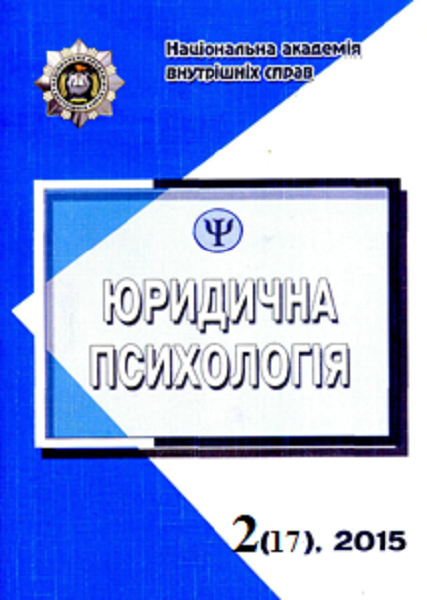Psychological Features and Formation of Juvenile Personality and Criminal Behaviour
Abstract
The article deals with child’s mercenary orientation forming the genesis of criminal behavior of juveniles as well as the analysis of objective (common) and subjective (specific) for any child responsible of crime. Indicated that under the Constitution of Ukraine main public priorities and social values are life and health, honor and dignity, integrity and security of human. That is why the course of state policy in the field of child protection was a subject of concern only for legal scholars and law enforcement practitioners, but also the general public. With a view to introduction in Ukraine of European standards for the protection of children's rights, our country has undertaken a number of international legal obligations to ensure proper mental and physical development of young people, their protection against any deviation in terms of behavior.
Note that the current socio-economic and political changes in the country related to reform in all spheres of public life, will inevitably lead to significant changes in the social space, breaking the old moral values, norms, traditions and stereotypes. These transformations have a negative impact on identity formation of children and contribute to committing crimes and other offenses. Results of the study indicate that psychological characteristic of adolescents are: increased emotionas, self-doubt, feeling of dependence on adults anxiety. Antisocial lifestyle leads to a high level of aggression and hostile destructiveness, affectivity, negativity, emotional instability. However, the basic moral principles in children who commit an acquisitive crime or not informed or crooked, and criminal lifestyle lead to the acquisition of complex opposition to the society; they also possess distorted idea of freedom, friendship, generosity as guiding norms.
Downloads
Abstract views: 330 PDF Downloads: 1147
- Authors reserve the right to authorship of their own work and transfer to the magazine the right of the first publication of this work under the terms of the Creative Commons Attribution License, which allows other persons to freely distribute published work with mandatory reference to authors of the original work and the first publication of an article in this magazine.
- Authors have the right to enter into separate additional agreements on non-exclusive dissemination of the work in the form in which it was published in the journal (for example, to post an article in the institution's repository or to publish as part of a monograph), provided that the link to the first publication of the work in this journal is maintained.
- The journal's policy allows and encourages the posting of articles by authors on the Internet (for example, in electronic storehouses of institutions or on personal websites), both before the submission of this manuscript to the editorial office and during its editorial processing, as this contributes to the creation of a productive scientific discussion and positively affects the efficiency and dynamics of citing the published work.




